The Best Song From Each Wilco Album, Ranked from Worst to Best
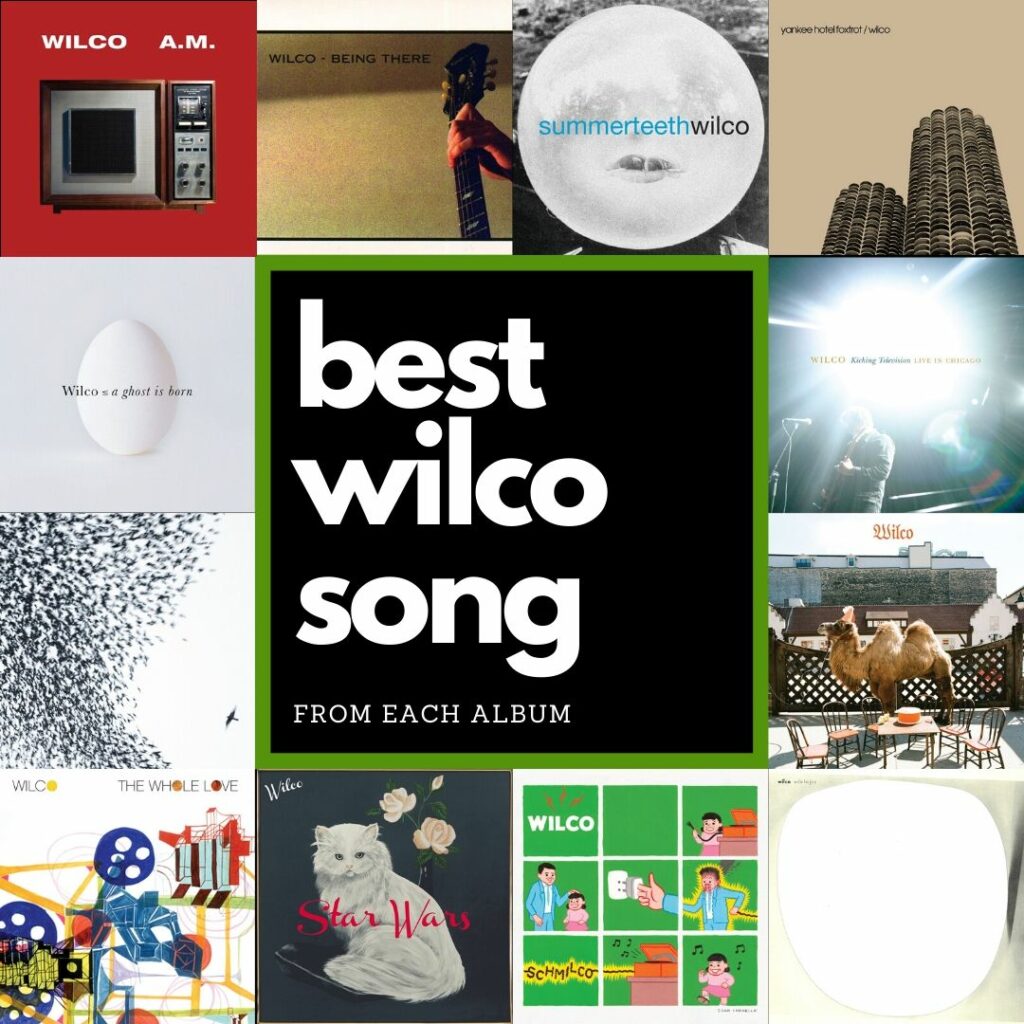
In an alternate timeline, today is the day that Wilco closes out High Water Festival 2020 at North Charleston’s Riverfront Park. It would have been Wilco’s first performance in Charleston since 2008, though Jeff Tweedy did perform solo at High Water Festival in 2018. This current timeline features no such performance, for reasons that don’t need explaining. It does still feature the new Wilco album, Ode to Joy, though, released last year. The new album was the reason for the band’s extensive touring that was scheduled for 2020.
Wilco is still an incredible band with an impressive discography; 11 studio albums. And that’s not counting the three albums of Woody Guthrie songs they did with Billy Bragg. Wilco’s catalog is one of the deepest and most consistently good of any rock band in the past 30 years.
Jeff Tweedy has a knack for writing relatable songs in the most abstract of terms, and Wilco have long been pioneers of using the studio as an instrument. Their music has inspired an entire generation of artists, many of whom would have shared the bill with them on the High Water 2020 lineup.
It was tough to narrow it down, but we’ve managed to rank the best Wilco albums and pick our favorite Wilco song from each one.
If you ever wanted to listen to Wilco (or maybe the Grateful Dead) but didn’t know where to start, this article can help point you in the right direction. If you already love Wilco, we know you have your own opinions about their best songs and albums so feel free to leave a comment and let us know. We’d love to debate the best Wilco songs with you.
11. Star Wars (2015) – Best Song: “Cold Slope”
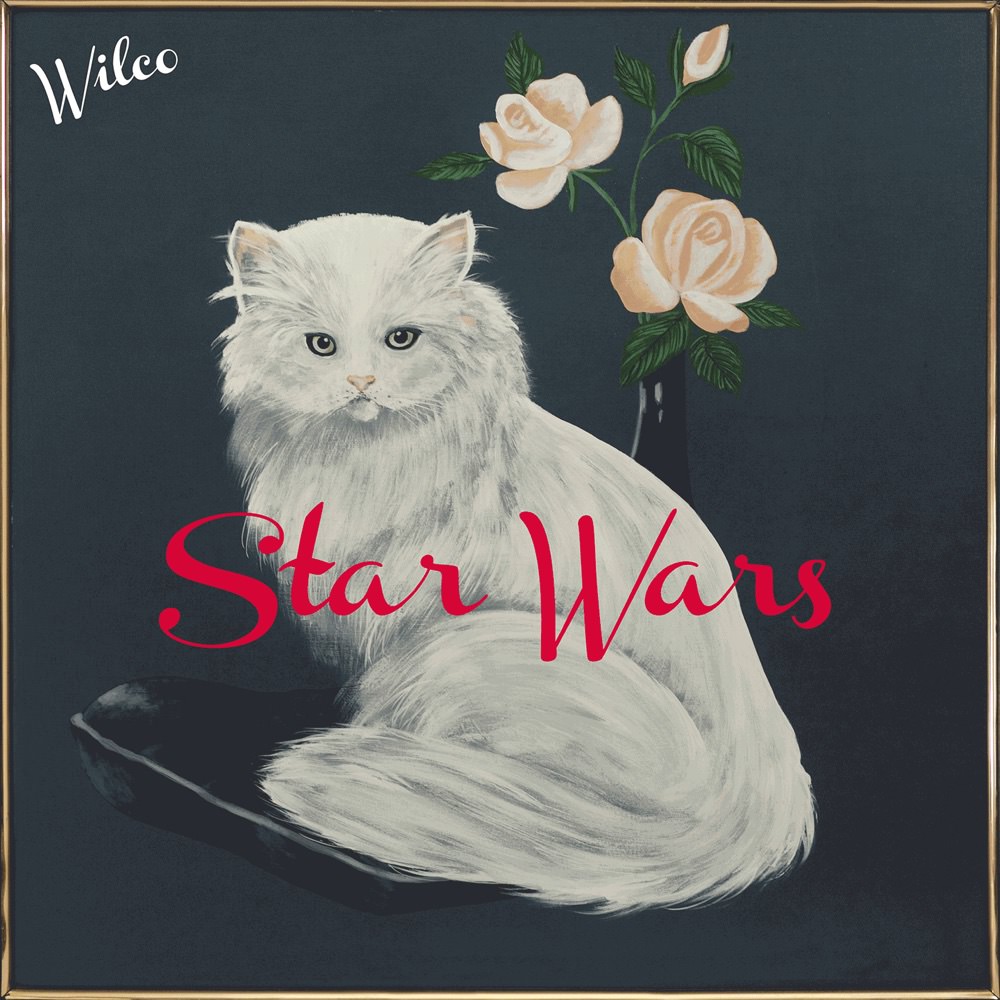
Wilco’s 2015 album, Star Wars, was the second Wilco album to be released on dBpm Records. It was initially released for free, with no hype or prior announcement. It just popped up one July night as a free download on their website. This marked the longest release gap between albums to date. In the meantime, Jeff started a band called Tweedy with his son Spencer, and together they released a fantastic album called Sukirae.
Star Wars is at its worst, the least enjoyable Wilco album. Star Wars is jerky and abrasive, with an oddball futuristic tone to it. The album does still have that classic Wilco building of tension to a peaceful release, but the buildup is glitched out and can be very much in your face at times. All Wilco albums, at least since Being There, do have an element of tension and anxiety to them, but Star Wars is the most anxiety-inducing overall listen.
Despite the abrasive nature of Star Wars, it does excel at what it sets out to do. Wilco is clearly trying to put us on edge right from the start; with opener “EKG” that is just one straight minute of building course tension. The second track starts with that light release of tension that Wilco does so well, and the seamless transition lets us know right away that Wilco is going to take us for a ride, and a fast one at that, as Star Wars is actually the band’s shortest record to date.
Track 3, “Random Name Generator”, is the “hit” from Star Wars, meaning its the song that’s gotten the most streaming traction. It’s also a prime example of the type of sound that the album dials in. The guitar is loud, industrial, and repetitive, and it clocks a jarring groove that is just slightly too uncomfortable.
Star Wars does settle into a vibe as it goes, and really shines on side 2, as the best handful of songs on the album are all in the second half. “Cold Slope” is probably my favorite there, because of the guitar tone and the straightforward sound, but I’ll be honest, I don’t hold any particular attachment to any of the songs on this album. Star Wars is my least favorite Wilco album and I’ll leave it at that.
10. A.M. (1995) – Best Song: “Passenger Side”
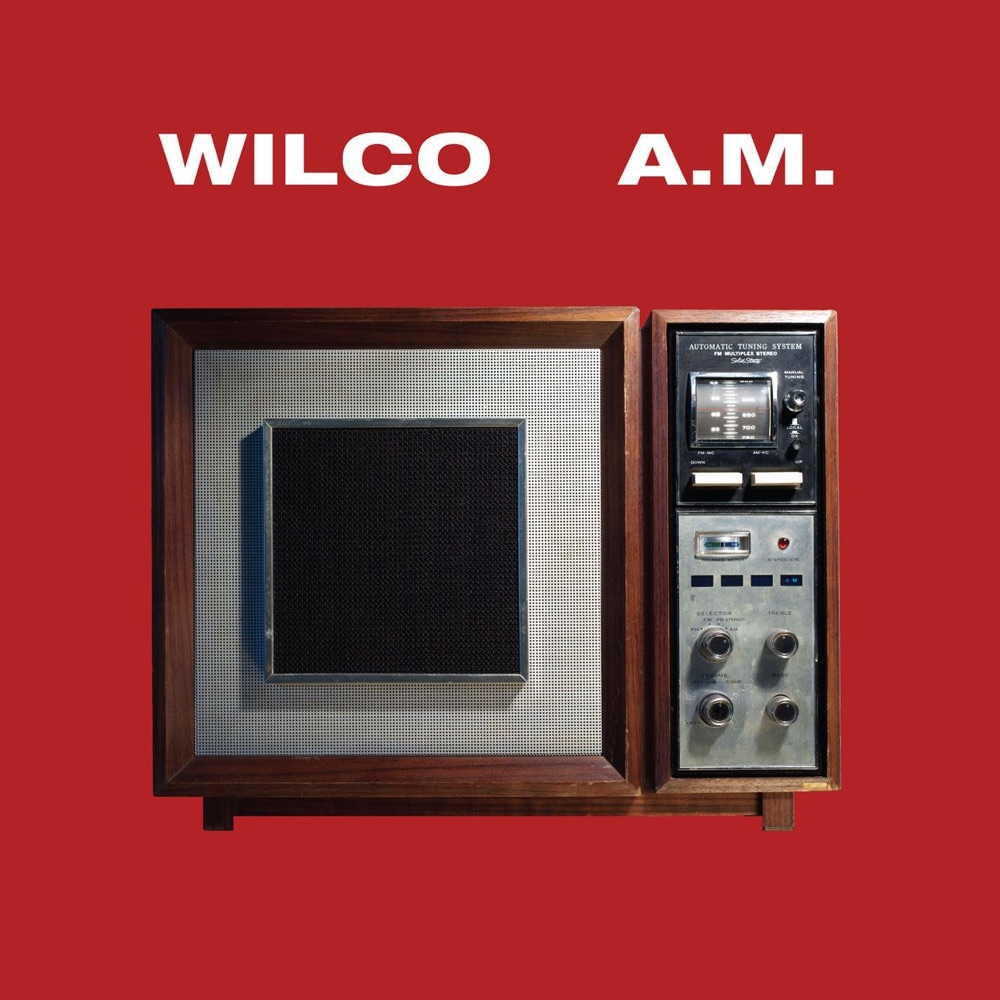
Ah, Wilco’s first album: an alt-country record. A.M. comes from the ashes of Uncle Tupelo, the band that Wilco’s frontman and songwriter Jeff Tweedy was part of with his former friend Jay Farrar. Uncle Tupelo, who many credit as being the first alt-country band, broke up in 1995 after Farrar and Tweedy could no longer get along. Farrar went on to form Son Volt, and Tweedy of course started Wilco.
A.M. sounds like more of a continuation of Uncle Tupelo than it does anything that Wilco released afterwards. It makes sense, because at the time of the album’s recording, Wilco consisted of every Uncle Tupelo member except Jay Farrar. It basically was Uncle Tupelo. Although A.M. doesn’t sound all that much like “Wilco”, it’s still a solid record and definitely worth checking out, but I wouldn’t start with it as somebody new to Wilco. Come back to A.M. later, after you have a better grasp on what this band is all about.
As for the best song, I would say “Passenger Side” takes the cake with A.M.. It’s a fairly simple song, and nothing special production-wise, but lyrical content is what makes it great.
In “Passenger Side”, Tweedy sings from the perspective of somebody who is riding in the, you guessed it, passenger seat of a car, but not by his own free will. With lyrics like “You’re gonna make me spill my beer / if you don’t learn how to steer”, and “I’ve got a court date coming soon / I’ll be driving soon”, one can assume that the song is sung through the lens of a frustrated alcoholic, drunk and thinking he can do better than whoever is driving. It’s a metaphor for the alcoholic’s own life, which he is not in control of, but he knows that he should be.
“Blue Eyed Soul” is another standout from A.M., and an early hint at the more abstract type of songwriting that Tweedy will explore with later Wilco albums. It’s a slow alt-country song about how you’ll lose your soul if you don’t express yourself.
Overall, A.M. is a deceptively lighthearted, easygoing opening to a discography that will grow increasingly dark, abstract, and often much more complex with time.
9. Wilco (The Album) (2009)
Best Song: “One Wing”
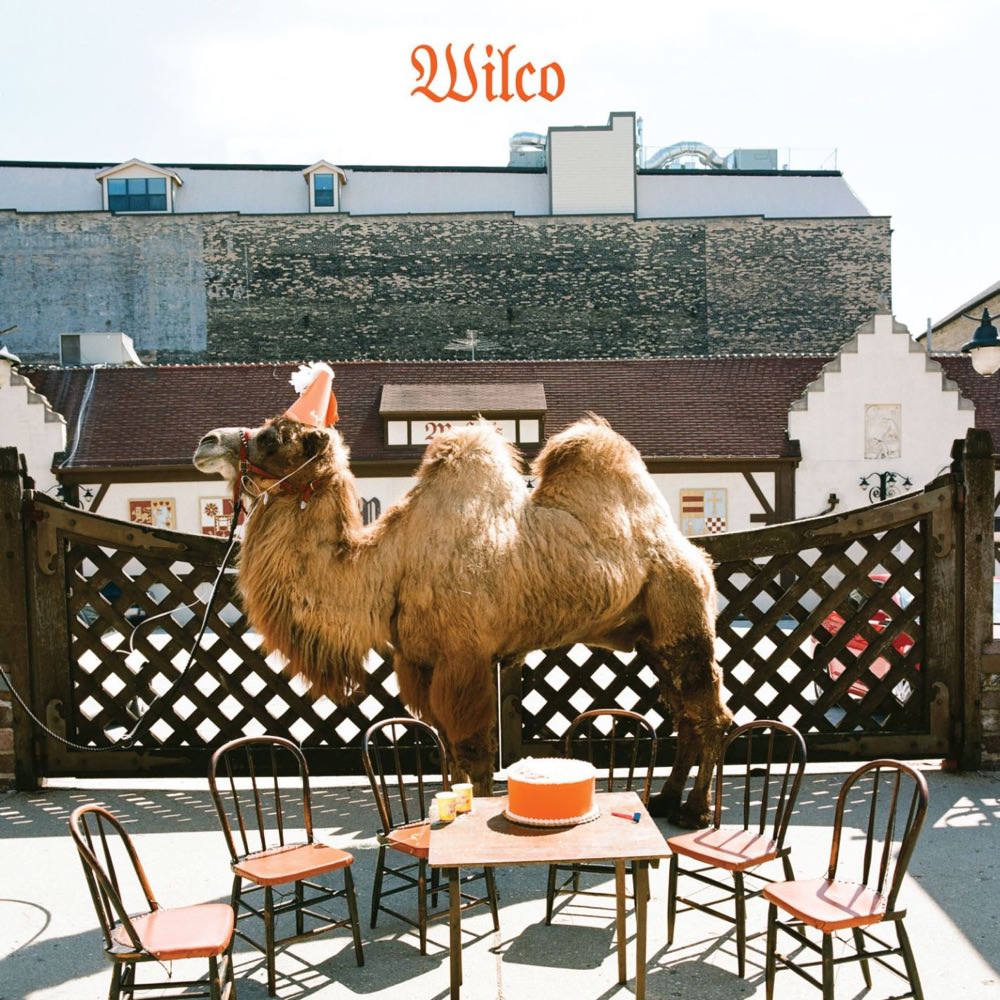
Wilco (The Album) is titled as such because the band felt that this album boiled down to being a metamusical description of the band. This holds true, as Wilco (The Album) does explore many different genres of music that are drawn from the entire musical spectrum of the band’s existence. Which, with this being Wilco’s seventh studio album, was getting to be pretty wide at this point. The album has some more experimental songs, some folk songs, some hints of country, and of course they were back to using the studio as an instrument again.
Wilco (The Album), while a solid record all the way through, is on the whole one the band’s weaker albums. I enjoy the idea behind it, and I do think it has some great Wilco songs on it, but it just doesn’t feel as if they really broke any new ground or jazzed it up with anything unpredictable or wildly abstract or experimental. The closest thing we get to that is”Bull Black Nova”, which is a violently dark, gripping listen in a territory that will be further explored half a decade later with Star Wars.
The opening track, “Wilco (The Song)” indulges in a level of self-awareness that goes a little bit too far. The song presents Wilco’s music as a “sonic shoulder for you to cry on”, which while that may be true, hearing it stated outright like that detracts from the magic. There has always been this feeling of comfort in Wilco, however subtle it may be, that makes it such a soothing listen when you’ve got a lot on your mind. We’re all over here seeking shelter in your music, Jeff, you don’t need to tell us what we already know.
“You and I” is a very simple, yet beautiful song that holds the torch as the first ever duet to appear on a Wilco album. The track features guest vocals from Leslie Feist, of the band Feist, whom Jeff reportedly met randomly at a music event and the two bonded over an appreciation for each other’s music. The song describes a relationship that is troubled by what I take to be communication problems, but held together by a deep emotional bond. The female vocal presence makes for a nice change of pace in a catalog that has been sung by entirely Jeff Tweedy up until this point.
The star of the show, though, at least for me, is “One Wing”. The song features Nels Cline doing his dance, as always, but here he uses a tone similar to the one he used on Sky Blue Sky, and sparingly builds up in touches on the mix along with the building intensity of the song. “One Wing” starts out small and continuously adds more and more layers as it evolves into a more complex song that finally explodes into a big final hook, bookended on either side by a guitar solo.
Overall, Wilco (The Album) is a nice showcasing of the band’s talents, but a somewhat forgettable listen when compared to the rest of their catalog.
8. Ode to Joy (2019)
Best Song: “An Empty Corner”
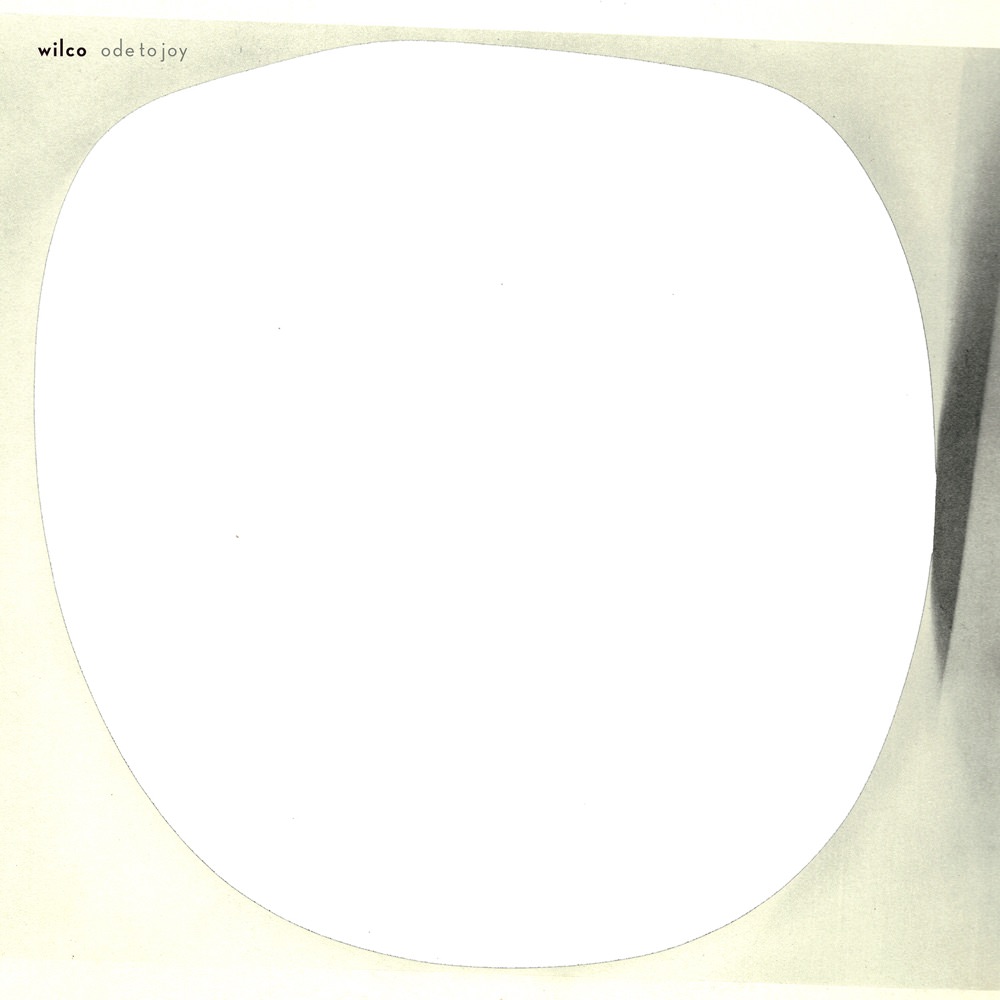
Ode to Joy was a highly anticipated release, at least for the indie nerds out there. It was the first Wilco album to drop since 2016, and since then Jeff had published his memoir and released three solo albums. It was also being treated with much more anticipation by the band themselves, who were coming off two full-length albums that were released seemingly on a whim, with titles that suggested that the band wasn’t taking themselves seriously. Tweedy stated in a recent interview with Spin that he felt he did Star Wars and Schmilco a disservice in that way, and thus Ode to Joy was treated with more care. It’s also a deeper, more intricate album than either of the previous two.
Like all Wilco albums, there is something “different” about Ode to Joy. The most obvious, notable difference is one that we first heard on Jeff’s solo work that came between this album and Schmilco: Jeff’s vocals. He’s singing with a much more strained voice on his more recent recordings, almost to the point of being tired. This is to some extent a creative choice, well-evidenced by the overarching strained tone that spans Ode to Joy. The album sounds like it is very deliberately coming to sonic conclusions, and taking a lot of concerted effort to get there. Lyrically, Ode to Joy takes similarly strained approach, sung from some remote place as observations and questions.
Ode to Joy is also filled with seemingly random little production tricks, intricate details that embellish themselves over time. For example, take the snare on “One and a Half Stars”. At points, it bounces high above the mix and drives the song, but it also decreases in intensity behind the vocals at points. You could lay there and listen to just the snare and have a fulfilling listening experience. But it’s not the focal point of the song, and there are many other oddball details going on all around. Wilco used a similar trick on Yankee Hotel Foxtrot with the song “Heavy Metal Drummer”.
“We Were Lucky” is the most intense song on the album, and pulls that age-old Wilco trick of mounting tension and release that they’ve been high on since “Misunderstood”. Yet it gets us every time, because they keep finding new ways to dazzle us that are just as interesting as the last time.
My personal favorite, at least at this current juncture, is the final song, “An Empty Corner”. It’s got perhaps the most haunting atmosphere of any Wilco song ever made, and the emotional weight behind the lyric “You got family out there” is enough to make you stop whatever you’re doing and reflect for a moment when you hear it. “An Empty Corner” can really creep up on you, and if you aren’t careful you might not notice the tears that welled up in your eyes.
The point is, Wilco has done it again with Ode to Joy. Their entire catalogue is filled with beautiful music that you can get lost in for weeks and weeks on end. Then you can come back later, when you’ve got a new set of experiences and emotions, and Wilco will help you process them once again.
7. Schmilco (2016)
Best Song: “Someone to Lose”
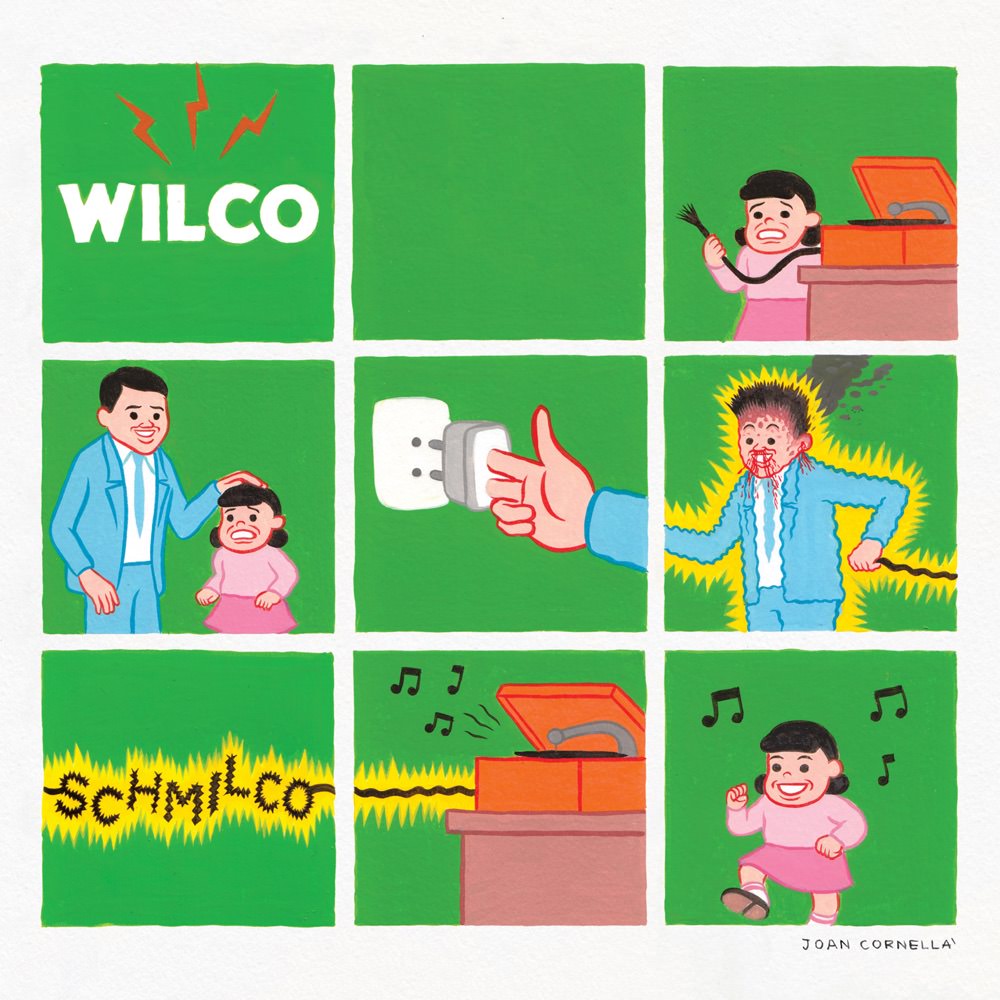
Schmilco was released about a year after Star Wars, and the two records have almost a yin and yang effect. Where Star Wars was often loud and abrasive, Schmilco is laid-back and chill, for the most part. When the album was first released, it felt a little bit boring, but in the years since its release and with subsequent listens it have revealed its subtle beauty. Schmilco has climbed my personal rankings for Wilco albums in recent years and by now it has become one of my most frequent streams.
Part of the yin and yang effect that I mentioned earlier probably has to do with the fact that Star Wars and Schmilco were born of the same recording sessions at Wilco’s Chicago studio, The Loft. There really is a palpable pivot of energies between the two records, and some folks on Reddit enjoy listening to both albums back to back, as if it were a double album. I’d rather just listen to Schmilco twice in a row.
Schmilco is about the same length in minutes as Star Wars, but it has a much more patient approach. With the exception of “Locator”, the songs on Schmilco are gentle and peaceful, and they float along with acoustic tones and tiny layers of sound that criss-cross beautifully. There are many times where I want to listen to a Wilco album, but don’t want to have an existential crisis. Schmilco is that album.
“Locator” is the one track that doesn’t fit that mold. It comes about three quarters of the way through the album and serves to shake things up a little bit. It’s the shortest song on Schmilco, and it packs a lot of distorted motion into a compact chunk of music. It comes in, grabs you, lifts you up, and gently fades away. If you’re into Wilco doing things that don’t make sense but end up working, then “Locator” is going to be the song that does it for you here. But it’s not the Extra Chill choice for best song on Schmilco.
That honor goes to “Someone to Lose”.
“Someone to Lose” is a shining example of the colloquial lyricism that Jeff Tweedy explores with this album, and it’s done very confidently here. “Someone to Lose” takes the simple concept of a breakup song and turns it on its side, pointing the lens inwards. The chorus of “I hope you find someone to lose someday” suggests that you yourself are not someone to lose, and you hope that the person leaving you finds somebody better ’cause you know you ain’t shit, either.
In short, Schmilco is a worthwhile album that won’t make you jump through hoops to enjoy it. It’s not Wilco’s best album, but it’s far from their worst.
6. Summerteeth (1999) – “Via Chicago”

Wilco started to dip their toes into production with Being There, but with Summerteeth they fully went for it. Summerteeth pretty much eliminates the alt-country thing in favor of experimental pop-rock songs that are the result of many hours of Jeff Tweedy and Jay Bennett taking drugs in the studio. This record has some of Wilco’s best individual songs, and it truly shines lyrically, but it’s sometimes too heavy on the overdubs to the point where the more upbeat songs might sound tinny and irritating if you aren’t in the right mood.
Summerteeth was recorded in two sessions, with a break in between when the band decided to go record the first Mermaid Ave record with Billy Bragg. So that’s where Tweedy channeled his alt-country for the time being. When Mermaid Avenue was done, Wilco returned to the studio to finish recording Summerteeth. And that’s when the drugs kicked in.
As Tweedy wrote in Let’s Go (So We Can Get Back), he has always suffered from migraines. He tried everything to solve them, but nothing did the trick until he discovered Vicodin. Boom. No more headaches. Lots more Vicodin. Tweedy’s bandmate and compadre Jay Bennett was also into his own prescription drug cocktail, and together they got strung out and indulged in the idea of using the studio as an instrument. The second recording session for Summerteeth consisted of a whole lot of overdubs, even sometimes drowning out the other band members. Summerteeth became the Tweedy and Bennett show, and they broke free in the studio to experiment at will.
Lyrically, Summerteeth gets very personal, and Tweedy crafts lyrics that are often ambiguous, dark, and cryptic. Many of the topics revolve around relationships, feelings of loneliness, and reflection. The production does a great job of floating Jeff’s vocals at the top, so that even when the synth overdubs are at their most aggressive, you can still follow the lyrics. It is very strange, however, to put these dark lyrics over such ambitious pop songs.
“Via Chicago” is easily the best song on Summerteeth. The opening line, “I dreamed about killing you again last night / And it felt alright to me” is striking and it grabs your attention immediately. We’re entering Jeff Tweedy’s fucked up dream world. The song itself is much more raw and subdued than the majority of other songs on the album, and the story in the lyrics represents that feeling of longing and solitude that we have all experienced.
The production contributes the same kind of distorted guitar feedback that will become a centerpiece of Wilco’s next album, Yankee Hotel Foxtrot. The song builds to a beautiful cathartic break during which the feedback and drums come together to almost sound like a train pulling into a station. It sounds like the song itself is coming home, via Chicago, in tandem with the lyrics.
“Via Chicago” is the type of song that Wilco does best. Subtle, with moments of discomfort that are built until they lift away to be relieved by peaceful relaxation.
P.S. – If you like the guitar feedback and buildup on the Summerteeth recording of “Via Chicago”, the live version on Kicking Television takes this to a whole new level of intensity.
5. The Whole Love (2011)
Best Song: “Art of Almost”
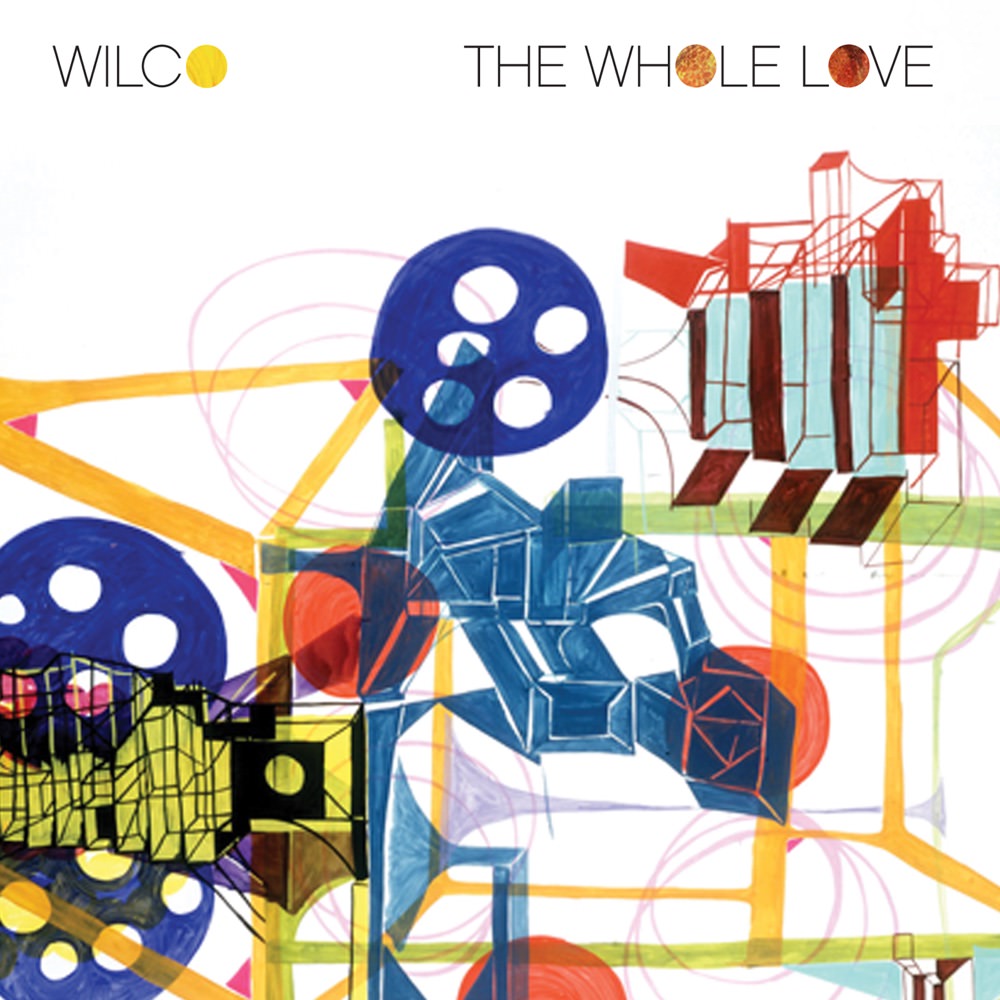
Wilco entered into their third decade of releasing music by getting back on their feet in the sense of exploring different sonic territory with The Whole Love, the first self-released Wilco album on their label dPbm Records. Right from the get-go we have “Art of Almost”, which is perhaps the most exciting intro track in the band’s entire discography. It sets the tone for the rest of the album, which while certainly a better album than Wilco (The Album) and probably Sky Blue Sky, too, it still doesn’t manage to capture the same magic of Yankee Hotel Foxtrot or A Ghost Is Born.
But this is a different band now, and The Whole Love captures its own kind of magic in a way that is uniquely Wilco. The Whole Love is a pivotal album between phases of Wilco, and serves as a separator of sorts between their pre-2010 material and everything that they’ve released since.
The thing about The Whole Love is that while it is a stellar album, the best two songs are so easily the first one and the last one that it almost diminishes the importance of the rest of the songs. “One Sunday Morning (Song For Jane Smiley’s Boyfriend) is the beautiful twelve minute long slow-burner that caps off the album. Listening to that song feels like you’re being released gently back into the world after being thrown into a maze by “Art of Almost” and wandering your way through the ups and downs of The Whole Love.
The parenthetical title of the song references a conversation that Jeff Tweedy had with the actual real-life boyfriend of author Jane Smiley, in which he told Jeff a story that inspired the lyrics for the song. The lyrics are strikingly dark in contrast with the spellbinding and peaceful nature of the arrangement, exploring an abusive father-son relationship in which the son feels a sense of peace when his father is finally dead and buried. The song takes an atheist approach to the father’s rigid Christianity, a theme that is seen at a few other points in Wilco’s discography (“Theologians” from Summerteeth, for one).
Now, I know I said that “Art of Almost” and “One Sunday Morning” are the two best songs on The Whole Love, and they are, but there is one very special thing about Wilco that works quite well with this album in particular. The more you listen, the more you hear subtleties in the songs that cause you to appreciate them in new ways.
“Sunloathe” is one of the songs from The Whole Love that I didn’t fully come to appreciate until I saw the music video. It’s a psychedelic, claymation adventure that makes for such a great visual accompaniment to the song because it shines light on layers that might have gone unnoticed otherwise.
For this reason, The Whole Love is worth exploring many times over, and coming back to again once you’ve been through the rest of Wilco’s music. You’ll find that The Whole Love stands the test of time and repetition just as well as Wilco’s most adored records.
4. A Ghost Is Born (2004) – “Handshake Drugs”
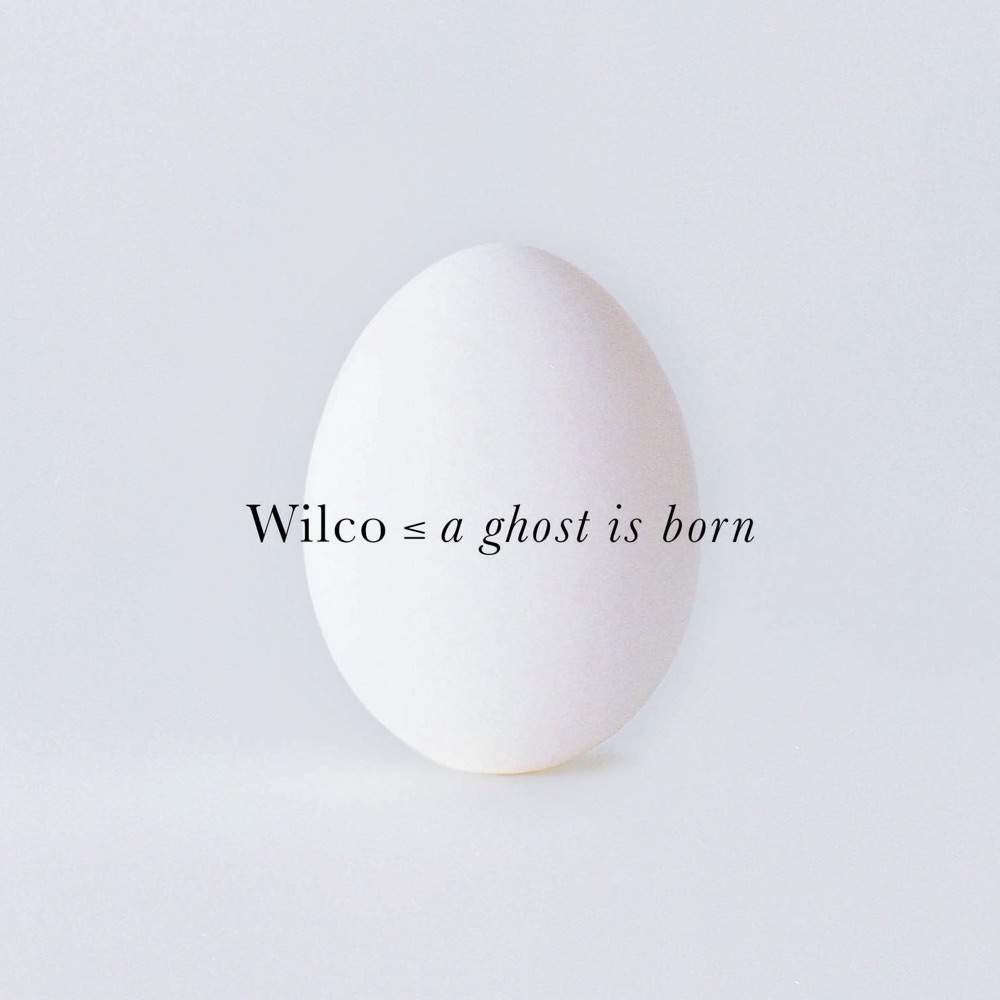
While Yankee Hotel Foxtrot is objectively the best Wilco album, A Ghost Is Born is certainly a the most out there, which might make it the best one for you. This album is very conceptually dark. In Let’s Go (So We Can Get Back), Tweedy refers to the A Ghost Is Born recording sessions as the darkest period of his life. Jay Bennett had left Wilco, and Tweedy was struggling with addiction and feeling very lost and worthless. He thought a lot about his two sons, Sammy and Spencer, during this time, and he legitimately thought that he was going to die from eating too many painkillers.
“A Ghost Is Born would be a gift to my kids, who could turn to it when they were older and put together the pieces of me a little bit more than I’d been able to put myself together for them in real life,” Tweedy writes.
If it weren’t for the 15 minute piece of musical horror that is “Less Than You Think”, A Ghost Is Born might be my favorite Wilco album. The song is fine for the first 3 minutes, but then it ceases to be a song at all and cuts into a 12 minute segment of pure noise. Yes, I understand that this is supposed to represent Jeff Tweedy’s mental state at the time, but the other songs on the album do that just fine themselves, and I can do without the 12 minute assault on my senses.
Now that I’ve got that out of the way, I can delve into what makes A Ghost Is Born such a great Wilco album, and explain why “Handshake Drugs” is my favorite song on the album.
A Ghost Is Born plays through like a dream that is constantly struggling to not become a nightmare. Between these moments of intensity and clarity are strung-out guitars and Tweedy’s strung-out vocals that are so desperately hanging on for dear life. He sounds like he can hardly get his words out, and there’s this distance between his vocals and the rest of the mix, but they’ve still got that light and airy Jeff Tweedy quality about them.
Some of the songs are smooth and gentle, with soothing guitar solos that seem to foreshadow what’s to come from Sky Blue Sky, except on A Ghost Is Born it’s much more raw, and much less hopeful. And then you have your pop songs like “Theologians”, except this time it’s a tongue-in-cheek commentary on religion and spirituality. It also coined the lyrical enigma “Cherry Ghost”, which doesn’t have a true meaning, but rather a feeling. The rock duo Illiterate Light is also named after a lyric in this song.
A Ghost Is Born is also the one Wilco album that features mostly Jeff Tweedy on lead guitar. Although his playing is as tired as his vocals, he manages to get through this album, which is one of the more guitar-heavy Wilco albums. Jeff explains in his memoir how recording “Spiders (Kidsmoke)”, the 10 minute guitar-driven anxiety jam nearly sucked the life out of him. The result is an abrasive song, done in a way that feels sleepy and effortless, at least according to Jeff’s parts.
“Handshake Drugs” is the catchiest, most accessible song on A Ghost Is Born, yet it’s also the most memorable, in terms of the way it feels. It’s bubble gum pop that feels like walking down a city street on a beautiful, sunny day, yet the lyrics are actually about buying drugs and being lost. “Handshake Drugs” smiles and keeps on moving even when our narrator has completely lost his mind. The song gradually gains momentum and the tempo rises and rises until eventually it drifts off into an abyss of distortion. It’s also got perhaps the best all-time Jeff Tweedy vocal sound and mix, with his voice floating over top in the exact way that it needs to.
A Ghost Is Born is Wilco’s most psychologically intense album, at least when it comes to the overall theme and background. This is Jeff Tweedy at rock bottom, and the music is reflective of that. At the same time, though, it’s laid-back and patient enough that you have space to access it, for the most part. If you enjoyed Yankee Hotel Foxtrot, but you want something just a little more hopeless, A Ghost Is Born is your Wilco album.
3. Sky Blue Sky (2007) – “Impossible Germany”

Enter Nels Cline, Wilco’s current lead guitarist, and Pat Sansone, the band’s current multi-instrumentalist. This is where Wilco again made a major change to the sound of the band. It was a step away from the abstract distortion and anxiety-driven music of the previous three Wilco albums toward a more jammy, accessible type of Wilco. If you were looking for somewhere to start with Wilco’s catalog that isnt Yankee Hotel Foxtrot, I’d say go with Sky Blue Sky.
Part of the reason for the shift to a simpler sound had to do with the fact that Tweedy had conquered the addiction that had been haunting him, and was in a much better place mentally, so he wanted to take it easy. In his memoir, he writes about specifically wanting to simplify the band all-around, which meant adding more members to more easily play the complex songs on Yankee Hotel Foxtrot and the songs on A Ghost Is Born, which were crafted entirely in the studio and the band had to learn them afterwards. As a result the album was made with very few overdubs, and the band tracked most of it live.
“After a few records of getting more and more comfortable with an abstract and at times cryptic approach to lyric writing, I felt in desperate need of some clarity,” Jeff explains, “Life’s complexities had overwhelmed me to the point of hospitalization after our last record, so going into this one, I didn’t have much of a taste for pushing myself to any extremes artistically.”
Sky Blue Sky is a mellow record that doesn’t try to do anything crazy. Instead, it’s filled with wonderful guitar playing from Nels Cline and accented with gentle synth, and it’s a nice, easy listen. It’s all very straightforward, with hardly any studio tricks at all. Just pure musicianship all the way through. And by God I can go on and on about Nels Cline’s guitar sound on this record. It’s what drew me to Wilco in the first place, and it’s the reason why I would recommend Sky Blue Sky to somebody who is new to Wilco. It’s such a relaxing tone that it’s hard to not enjoy the music.
Lyrically, too, Sky Blue Sky is simple. Instead of poetic and dark abstractions, we get storytelling hopeful imagery. You don’t need to sit down and meditate on the meaning of these songs. Jeff writes with a very direct tone that mirrors the straightforwardness of the instrumental arrangements. This is another part of what makes Sky Blue Sky such an accessible record. There is still an emotional element to the lyricism, it’s just not hidden behind ten layers of Jeff Tweedy’s demons for a change.
The song that stands out the most on Sky Blue Sky is “Impossible Germany”, which was actually the song that inspired me to really dig into Wilco in the first place. When I was a sophomore in college, around 2012 or so, my buddy and I smoked a joint at his apartment and he was raving about this band. He put on their Ashes of American Flags DVD and we watched the whole thing. I remember being completely floored by their performance of “Impossible Germany” from that film and as soon as I got home I listened to the rest of Sky Blue Sky and branched out from there.
I will say, though, as far as starting with Sky Blue Sky. It truly doesn’t sound like any of their other albums, before or after, and it’s certainly not their best album. None of them sound the same, but this one is just by far the easiest to digest, and it’s very clean. So I’m sure there are some people out there who only like Sky Blue Sky and don’t actually enjoy any of Wilco’s other, more experimental albums. Either way, it is my belief that every music fan in the world should listen to “Impossible Germany” at least once.
2. Being There (1996)
Best Song: “Misunderstood”

Wilco’s second album, Being There, shows the band finding an original thread to tug on, and thus started the unraveling that has continued to this day. The sound is distinctly different from what’s on A.M., or anything that Uncle Tupelo ever did. Being different was essential for Wilco in 1996, because A.M. was not exactly received well. Being There was different enough to kickstart Wilco’s career, and ultimately, their legacy.
Being There is also when the Jay Bennett era of Wilco begins. Bennett joined the band in 1994, replacing former Uncle Tupelo member Brian Henneman on guitar, and quickly became a strong creative contributor to the band and a close friend of Jeff Tweedy’s. He had a lot of creative input in Wilco’s recordings from Being There right up through the completion of Yankee Hotel Foxtrot in 2001.
What makes Being There so interesting is that Wilco, for the first time, is not afraid to experiment. For a band that has since built its identity on experimental production in tandem with Tweedy’s emotionally-honest songwriting, this was huge. Wilco, the cute alt-country band with some clever songs, had become Wilco, the influential American rock band. Of course, nobody knew that back in 1996, but today, with Wilco’s entire discography stretched out in front of Being There, it’s clear that all the things that Wilco is admired for today are present in their most raw forms on this album.
“Misunderstood” opens the album with an unsteady anthem of troubled suburban youth. The song is simple in structure, but it’s garnished with Wilco’s first go at cathartic experimentation, and builds to a big break at the end that according to Jeff Tweedy’s 2018 memoir, Let’s Go (So We Can Get Back) was a result of the band passing their instruments around and playing them very loud, and then stacking takes in layers on top of one another to create the crash that closes out the song.
With “Misunderstood” Tweedy speaks directly to something that we have all felt at some point or another: being lost in life. And when you’re presented with an easy out, like some party in town with all your friends, you can do that in the name of “rock and roll” instead of actually confronting the problems that led you to being lost in the first place. “Misunderstood” brings all of that to light through words that can easily be related to your own experiences and emotions, and that give you the sense of no matter how lost you’re feeling, there is somebody out there who feels just as lost, so you’re not alone. And that is Wilco.
“Short on long term goals / There’s a party there that we ought to go to / If you still love rock and roll / If you still love rock and roll”
Now, when you open an album with something as timeless and beautiful as “Misunderstood”, you really set the bar high for yourselves. Being There doesn’t even try to top “Misunderstood”, at least not right away. After opening with that intense masterpiece, they dissolve into the gentle cosmic country of “Far, Far Away”, which leads you to realize that you weren’t even ready for another one like “Misunderstood” quite yet anyway.
Being There flows through all these different styles and moods across two discs and 19 different songs, yet somehow does not trip over itself one single time. The transitions, however drastic they may be, all work in the context they are placed in. When Wilco jumps from a quiet acoustic song to a 90s garage rock jam, it feels natural, or perhaps so unnatural that it becomes natural. Either way, it works, and it’s an album that I keep coming back to year after year because it simply does not get old.
“Sunken Treasure” opens disc two is the only other song on the album that comes close to “Misunderstood” in terms of experimentation and the inherent relation to those who feel disconnected with themselves or the world around them. “Sunken Treasure” takes that concept into a relationship, perhaps with oneself, where you feel “out of tune”. The song builds from a quiet beginning into a buildup of noise, and lets you down easy with a peaceful release and lyrics that feel so damn good in the context of the moment.
“Music is my savior
I was maimed by rock and roll
I was maimed by rock and roll
I was tamed by rock and roll
I got my name from rock and roll“
There are many, many good songs on Being There, but none of them are able to top the opener. “Misunderstood” just has a special magic to it, and many rankings list it as the best all-time Wilco song, which is something that I tend to agree with sometimes. This is open for serious debate, even within myself, and I know I will have it when I reach Summerteeth and “Via Chicago”. For now, though, consider Being There a classic Wilco album, and one that you can always count on to give you just the right mix of everything you need to get through another day.
1. Yankee Hotel Foxtrot (2002)
Best Song: “I Am Trying To Break Your Heart”

Yankee Hotel Foxtrot is easily the most well-known and influential Wilco album. This was their homerun, and it is still considered a masterpiece to this day. If it means anything to you, Pitchfork gave this album a perfect 10. If you want to start with one Wilco album, which I recommend you do, start with Yankee Hotel Foxtrot. People have their favorites, but objectively speaking, Yankee Hotel Foxtrot is the best Wilco album. None of the other albums, before or after, have lived up to the impact of this album, and much of the disapproval from both fans and critics about each new album since can be boiled down to, “Dang, I wish y’all would just release another Yankee Hotel Foxtrot.”
The funny thing about this album is that their original label, Reprise Records, didn’t think it would sell, and so after paying Wilco for the agreed amount, they decided to drop the band instead of following through with the distribution deal. Wilco then simply decided to release the album as a free download on their website. Yankee Hotel Foxtrot quickly took off running and generated a massive buzz via bootleg copies and downloads because yes, it’s just as good as everybody says it is, and before long they were picked up by Nonesuch Records to market and distribute the album.
It’s the classic cliché of the old-timer at the record label who doesn’t understand that he’s been presented with an album that will forever change the indie rock landscape. It’s a modern classic that will eventually be referred to with the same reverence as albums like Sgt. Pepper’s Lonely Hearts Club Band and Dark Side of the Moon, if it hasn’t already reached that point.
If you want to know why Yankee Hotel Foxtrot gets the praise that it does, the short answer is just listen to it. But I will try my best to explain, from my own understanding, what the yeehaw really is about this album.
Right from the get-go you have “I Am Trying To Break Your Heart”, another one of Wilco’s most memorable album openers, and one of their most iconic songs in general. Here Wilco dazzles you while they strap you in to their psychedelic carnival ride that will consume the next hour of your life. The ride’s just a little bit off track, so it feels kind of unsteady, and it’s pretty dark, but the sights and sounds are mesmerizing and you’re cool with being disconnected from reality anyways, right?
While you’re trying to figure out what exactly Tweedy is trying to convey in the lyrics, you find yourself relating to the songs in a way that you can’t exactly understand. Just follow the unreliable narrator in the music, and let your mind wander down the rabbit hole. You’ll be alright.
Wilco curates this disjointed psychedelic energy partially through the use of noise, which they had done to an extent in the past, but here they found something special and they burrowed into it. Somehow, they manage to use the uncomfortable feelings brought about by guitar feedback and distorted white noise in a way that manages to be tasteful and relevant. The noise that decorates these songs helps to tie the album together, bringing the listener deeper into the world that is generated by the music.
It’s a bit anxious in Wilco’s world, but there’s also comfort to be found. Wilco frequently draws out and builds this anxious tension, and then releases it into a moment of utter peace that is often supremely catchy. And this album is where they do that best. Just about every song has moments like I’ve described, and it’s all tied together by psychedelic production details that were clearly pored over down to every last detail in the studio.
Amid all this mesmerizing production and songs that climb emotional mountains, you’ve got the gentle, peaceful, “Jesus, Etc.”. It drops the experimental noise in favor of a violin, yet the sense of concrete meaning in the lyrics remains just out of reach. Here Tweedy seems to be accepting his confusion and letting himself ease into it. Out of all the songs on Yankee Hotel Foxtrot, this one has the most mainstream appeal because it’s relaxing and catchy, and it doesn’t dig inside your thoughts in quite the same way as the rest of the album. No matter how you listen to it, whether it’s in the context of YHF or on its own, “Jesus, Etc.” serves as a nice break from all the madness.
Peak psychedelia on Yankee Hotel Foxtrot hits with “Poor Places”. The song has all the elements that make this a fantastic album; the irresistible melodies, the anxious lyrics, the building of tension to a moment of relaxation, and of course, the noise. One full minute of it, to be precise, during which a voice (a sample from The Conet Projects) repeats the words “Yankee… Hotel… Foxtrot…”. It almost seems like the end of the album, but nope. The noise dissolves into “Reservations”, a sprawling 7 and a half minute study in spaced-out production that slowly fades to nothing.
With this album especially, but also with most of Wilco’s albums, the best song for you is subject to change depending on the headspace you find yourself in when you listen to it. That being said, I think this album is a masterpiece through and through and picking just one song as the best feels like a crime.
“Jesus, Etc.” feels like the easy choice, but I think I have to go with the opener, “I Am Trying To Break Your Heart”. There is just so much weight behind that song, and it really does cast a spell on you to set the tone for what you’re about to witness. You should really just start from the beginning and let this album play all the way through. Even if you’ve already listened to it a thousand times.